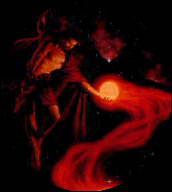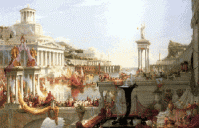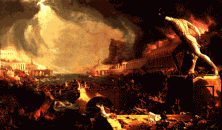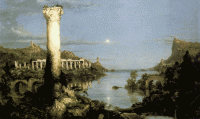Myths of Catastrophism I
The Celts were once asked by Alexander what it was they most feared in the world. They replied that they feared no one, but only that the sky might fall upon their heads.
Myths of Global Catastrophes
"What is quite normal in nature and society rarely rarely excite the myth-making imagination which is more likely to be kindled by the abnormal, some startling catastrophe, some terrible violation of the social code."[1]
If we are to look into the myths of catastrophism throughout the world we have to be select, for there are far too many - and though they are diverse, the story is often strangely similar, according to the cataclysm in question. Of all the keepers of ancient knowledge Egypt and Greece are the best known. In Plato's two last books, Critias and Timaeus, Plato records the story heard by Solon, the great Athenian law-giver. On his visit to Egypt, Solon questioned the priests on early history. He told them what his people knew about the Flood. One of them, an elderly priest known as Sonchis of Sais spoke up and mocked Solon and his city-state's ignorance of the ancient past. Sonchis explained the following:
"There have been and there will be many and divers destructions of mankind, of which the greatest are fire and water, and lesser ones by countless other means. For in truth the story that is told in your country as well as ours, how once upon a time Phaethon, son of Helios, yoked his father's chariot, and, because he was unable to drive it along the course taken by his father, burnt up all that was upon the earth and himself perished by a thunderbolt - that story, as it is told, has a fashion of a legend, but the truth of it lies in the occurrence of a shifting of the bodies in the heavens which move around the earth, and a destruction of the things on the earth by fierce fire, which recurs at long intervals."

After Zeus destroyed Phaethon with a thunderbolt he unleashed the flood to put out the fire and afterwards placed the the Sun's son in the sky as the Morning Star. The Egyptian priest explained to Solon that in these catastrophes the literary works of men perished, and it was for this reason that the Greeks no longer knew the true horrors of the past.
"O Solon, Solon, you Greeks are always children: there is no such thing as an old Greek ... You possess not a single belief that is ancient and derived from old tradition, nor yet one science that is hoary with age."
Sonchis explains;
"You remember only one deluge, though there have been many ... You and your fellow citizens are descended from the few survivors that remained, but you know nothing about it because so many succeeding generations left no record in writing."[2]
The shift of the earth's relationship to the sun and the planets in the solar system was recorded in the myths of most civilized cultures. Some accounts are quite specific. Plato wrote in Politicus:
"I mean the change in the rising and setting of the sun and the other heavenly bodies, how in those times they used to set in the quarter where they now rise, and used to rise where they now set ... the god at the time of the quarrel, you recall, changed all that to the present system as testimony in favour of Atreus.
He continues:
At certain periods the universe has its present circular motion, and at other periods it revolves in the reverse direction ... Of all the changes which take place in the heavens this reversal is the greatest and most complete ... There is at that time great destruction of animals in general, and only a small part of the human race survives."
Despite being of an eminent pedigree, the above is but one series of accounts. Plato has a lot of interesting things to say, and we may have time to return to a few of them later. Let's look at other myths supporting the theory of crustal displacement or significant changes in the earth's axis. Egypt again, is an excellent source. Pomponius Mela, a Latin author of the first century, wrote:
"The Egyptians pride themselves on being the most ancient people in the world. In their authentic annals ... one may read that since they have been in existence, the course of the stars has changed direction four times, and that the sun has set twice in that part of the sky where it rises today."
"In the second book of his history, Herodotus relates his conversations with Egyptian priests on his visit to Egypt some time during the second half of the fifth century before the present era. Concluding that history of their people, the priests told him that the period following their first king covered three hundred and forty-one generations, and Herodotus calculated that, three generations being equal to a century, the whole period was over eleven thousand years. The priests asserted that within historical ages and since Egypt became a kingdom, 'four times in this period (so they told me) the sun rose contrary to his wont; twice he rose where he now sets, and twice he set where he now rises."[3]
Distant civilizations have similar traditions. Mayan legend tells us that;
"... it was not known from where the new sun would appear. They looked in all directions, but they were unable to say where the sun would rise. Some thought it would take place in the north, and their glances were turned in that direction. Others thought it would be in the south. Actually their guesses included all directions because the dawn shone all around. Some, however, fixed their attention on the orient, and maintained that the sun would come from there. It was their opinion that proved to be correct."
The Chinese annals say that in the time of Emperor Yahou the sun did not go down for ten days. The world was in flames, and in their vast extent the waters over topped the great heights, threatening the heavens with their floods. The water of the ocean was heaped up and cast upon the continent of Asia; a great tidal wave swept over the mountains and broke in the middle of the Chinese Empire. The water was caught in the valleys between the mountains, and the land was flooded for decades.
"In a general convulsion of nature, the sea is carried out of its bed, mountains spring up out of the ground, rivers change their course, human beings and everything are ruined, and the ancient traces effaced . . ."
Emperor Yahou sent scholars to different parts of China, and even to Indo-China, to find out the location of north, west, east, and south by observing the direction of the sun's rising and setting and the motion of the stars. He also charged his astronomers to find the duration of the seasons, and to draw up a new calendar."[3]
"In that time the miracle is said to have happened that the sun during a span of ten days did not set, the forests were ignited, and a multitude of abominable vermin was brought forth."
"The breath of heaven is out of harmony ... The four seasons do not observe their proper times." (Texts of Taoism)
CONTINUE
[Apocalypse Aerie] [The Einstein Connection] [Ancient Maps] [Earth Crust Displacement] [Myths of Catastrophism] [History & Science in Myth] [Egypt; The Call of the Sphinx] [India; A Cradle for Civilization] [America; Fear of the Dark] [World Ocean; Path to Atlantis] [Precession; Warning of the Ancients] [Epilogue & Links]
[View Guestbook] [View Old Guestbook] [Sign Guestbook] [ ]
[Home] [Other Work]
Copyright © Marc Bergvelt. 1998-2003. All Rights Reserved.
[1] L.R. Farnell, The Value and the Methods of Mythological Study. Proceeding of the British Academy. 1920.
[2] Plato. Critias and Timaeus.
[3] I. Velikovsky, Worlds in Collision. Victor Gollancz. 1950.




